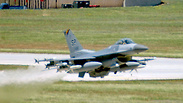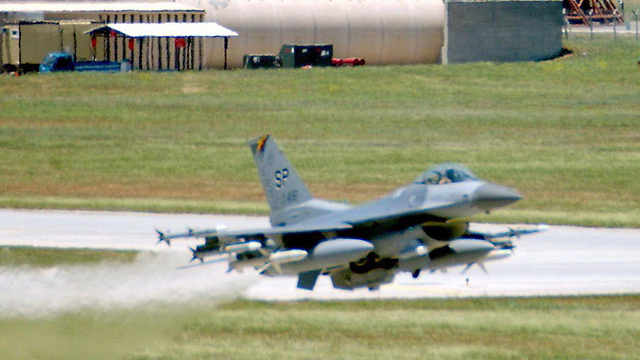
Photo: AFP/USAF
צילום: AFP / USAF
Turkey attacks ISIS in Syria, Kurds in Iraq
In policy turn-about, Erdogan allows coalition aircraft to use Turkish bases for attacks against ISIS while Turkish jets infiltrate Syria, Iraq.
Turkish fighter jets entered Syrian airspace to launch a fresh attack on Islamic State targets late on Friday, local broadcaster NTV reported.

A Turkish official could not confirm the report, although another broadcaster, CNN Turk, also reported that jets had entered Syrian airspace. A first attack on Islamic State targets on Friday morning was mounted by Turkish jets from a location inside Turkey, but close to the border.

An American jet takes off from a Turkish Air Force base. (Photo: Archive/AFP/USAF) (צילום: AFP / USAF)
An additional Turkish air strike took aim at Kurdish PKK militants in northern Iraq Friday night.
Ankara also said it had approved the use of its air bases by US and coalition aircraft to mount strikes against Islamic State, marking a major change in policy that has long been a sore point for Washington.
Turkey has long been a reluctant partner in the US-led coalition against Islamic State, emphasizing instead the need to oust Syrian President Bashar al-Assad and saying Syrian Kurdish forces also pose a grave security threat.
But Friday's attacks, which officials said were launched from Turkish air space, signaled that Ankara would crack down against Islamic State across the Syrian border, while pursuing the banned Kurdistan Workers Party (PKK) - which Ankara describes as a separatist organization - at home.
"In our phone call with Obama, we reiterated our determination in the struggle against the separatist organization and the Islamic State," Erdogan told reporters. "We took the first step last night."
Turkey has faced increasing insecurity along its 900-km (560-mile) frontier with Syria. A cross-border firefight on Thursday between the army and Islamic State, which has seized large areas of Syria and Iraq, left five militants and one soldier dead.
Turkey has also suffered a wave of violence in its largely Kurdish southeast after a suspected Islamic State suicide bombing killed 32 people, many of them Kurds, in the town of Suruc on the Syrian border this week.
But Erdogan's critics say he is more concerned with keeping Syrian Kurdish fighters in check, afraid that gains they have made against Islamic State in the Syrian civil war will embolden Turkey's own 14 million-strong Kurdish minority.
"Even though Erdogan has so far failed to achieve his goals in Syria - the overthrow of Assad - and Islamic State has become a problem, it is nevertheless a convenient instrument for him," said Halil Karaveli, managing editor of The Turkey Analyst, a policy journal.
"Now he has all the excuses he needs to go after the Kurds and also it makes him look very good in the eyes of the US, which will be happy that Turkey is on board in the coalition."
Opposition lawmakers from the pro-Kurdish Peoples' Democratic Party said Erdogan is intent on "obstructing" the advances made by the Syrian Kurds against Islamic State.
"The real aim of today's operations is not the Islamic State, but the democratic opposition," they said in an e-mailed statement.
News of the military operations further unnerved jittery investors, helping send the lira down nearly 4 percent on the week.
"Without distinction"
Three F-16 fighter jets took off from a base in Diyarbakir, southeastern Turkey, early on Friday and hit two Islamic State bases and one "assembly point" before returning, the prime minister's office said.
"We can't say this is the beginning of a military campaign, but certainly the policy will be more involved, active and more engaged," a Turkish government official told Reuters. "But action won't likely be taken unprompted."
Police also rounded up nearly 300 people in Friday's raids against suspected Islamic State and Kurdish militants, Prime Minister Prime Minister Ahmet Davutoglu said after vowing to fight all "terrorist groups" equally.
Local media reported that helicopters and more than 5,000 officers, including Special Forces, were deployed in the operation. Anti-terror police raided more than 100 locations across Istanbul alone, broadcasters CNN Turk and NTV reported.
One senior official told Reuters: "This morning's air strike and operation against terrorist groups domestically are steps taken as preventive measures against a possible attack against Turkey from within or from outside ... There has been a move to active defense from passive defense."
Turkey has repeatedly said it will take any "necessary measures" to protect itself from attack by both Islamic State and Kurdish militants.
Obama and Erdogan agreed in their call on Wednesday to work together to stem the flow of foreign fighters and secure Turkey's border.
US defense officials said on Thursday that Turkey had agreed to allow manned US planes to stage air strikes against Islamic State militants from an air base at Incirlik, close to the Syrian border. US drones are already launched from the base.
Turkey's Foreign Ministry went further on Friday, saying it had approved coalition strikes to be launched from its air bases. That would include air fields such as the one in Diyarbakir, southeast Turkey, from where it dispatched the F-16 fighters for the attack in Syria.
The ability to fly manned bombing raids out of Incirlik against targets in nearby Syria could be a big advantage. Such flights have so far had to fly mainly from the Gulf.
Turkey's stance had frustrated some of its NATO allies, including the United States, whose priority is fighting Islamic State rather than Assad. The allies have urged Turkey to do more to prevent its border being used as a conduit to Syria by foreign jihadists.










